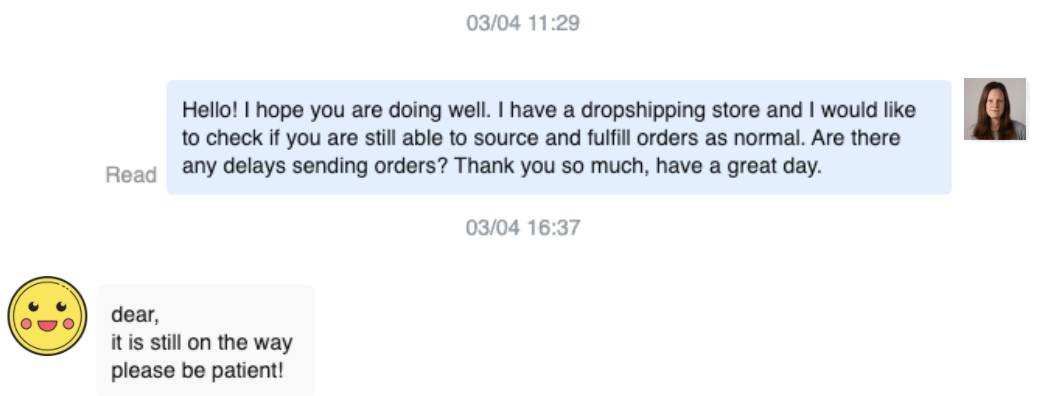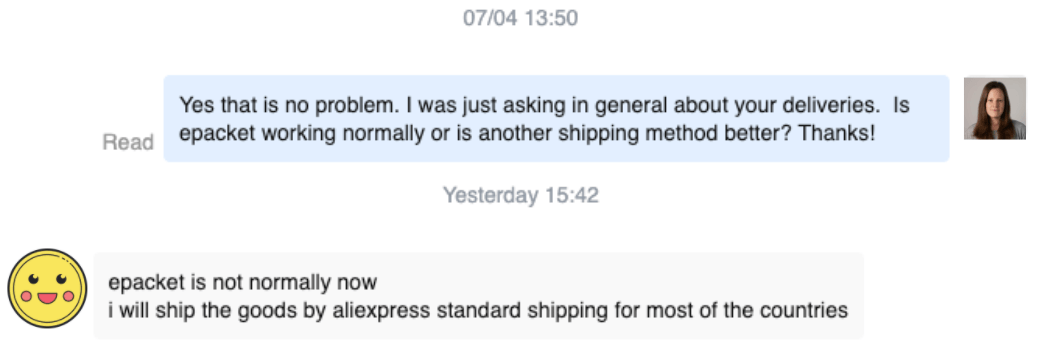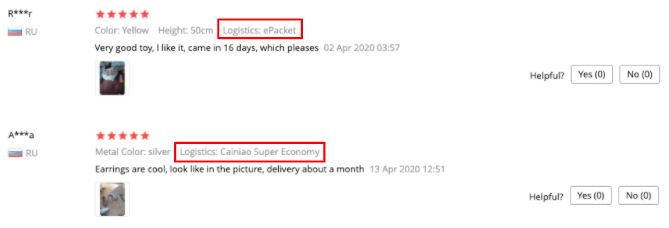With coronavirus continuing to disrupt so much of our daily life, it’s difficult for ecommerce business owners to know what the best course of action is.
Do you continue to take orders and try to fulfill them? Do you issue refunds to customers and hit pause on your store? It’s hard to know what to do. However, one thing that will help you be better informed is having clear communication across the board.
In a time when we’re all separated and inside our homes, it’s much better to be over-communicating than under communicating. After all, the absolute last thing you want is for something to go awry simply because you didn’t check with someone first or accurately convey a message.
When you’re running a online store, there are two groups essential to maintain excellent communication with – your suppliers and your customers. To help you make a more informed decision about what to do with your online store, we’ve put together some recommendations for talking with both groups.
We hope that these pointers will ensure that this time goes smoothly for your store, and you emerge with a good supplier relationship and happy customers.

Don’t wait for someone else to do it. Hire yourself and start calling the shots.
Get Started FreeSupplier Communication

Even if you’re just starting as a dropshipper, communicating with your suppliers is never a bad thing. The worst that could happen is they never reply to your message. But on the flip side, good communication could lead to a fruitful partnership as your store grows.
At the moment, there is a lot of concern about whether or not suppliers are open and operating. This is something that will vary supplier to supplier. However, with cities in China relaxing their lockdowns in even the hardest-hit provinces, it does appear that people are returning to regular life.
But don’t rely on rumors and reckons to figure out if your suppliers are working. The best way to find out for sure is to message suppliers directly using the messaging feature on AliExpress.
To decide how I would run my store during the pandemic, I messaged two of my suppliers. While one supplier never responded to my message, the second supplier did. At first, they interpreted my question about order fulfillment as me wanting to know where my products were, and told me to be patient.

However, after I followed up with more specific questions about the best method of delivery, I was given an excellent piece of information. Based on what this supplier had been experiencing, their suggestion was to avoid ePacket due to longer-than-normal shipping times.

I had heard about potential delays with ePacket shipping but was reluctant to change my shipping method based on what people were saying on message boards. However with my supplier now confirming these rumors, I decided to change to AliExpress standard shipping for the foreseeable future.
Dropshipper Pierre Emmanuel also took the time to talk with his supplier. After hearing more about the situation and getting their advice he has started using AliExpress standard shipping.
The reason for the slowdown in ePacket shipping is likely due to the reduction in air travel. Commercial flights often take cargo in addition to passengers, and with commercial travel having dropped so significantly, it’s taking longer for ePacket packages to get to destination countries.
Without having messaged my supplier, I wouldn’t have known for sure about this ePacket information. In fact, I almost certainly would have continued to send using this method. It was also very reassuring to know that my supplier was so easy to contact. It took five hours to get a response to my first message and a little over 24 hours for the second. So, it’s definitely worth trying this out to gain quick, actionable information.
As an aside, another way to get an idea about how long shipping is taking is going to the review section. Once there, sort the reviews by “latest.” This might not work for every listing, but if buyers have left detailed feedback, the most recent reviews could give you a rough idea about shipping times. What’s more, AliExpress reviews even include the type of shipping that the customer used.

Customer Communication
This probably won’t be the first time you’ve heard this, but customer service and communication can make or break your store.
If you have poor communication, this can quickly be reflected in reviews, which can have a knock-on effect on advertising. However, if you have good communication, you can rescue sales, ensure positive reviews, and maybe even gain repeat customers.
There could be many times in your store’s existence when you’ve encountered problems that have needed excellent customer service. Perhaps your supplier ran out of stock, changed the price without you realizing, or stopped selling a product you were advertising. In any of these situations, you would have had to reach out to the customer, explain the circumstances, and ask them to bear with you as you solved the issue. The good thing about the current situation is that everyone is already aware of it.

Because everyone is already aware of COVID-19, it makes it much easier to reach out if your store is experiencing delays. Your customers already know the world is being massively disrupted and will probably be sympathetic and understanding. After all, even the biggest companies in the world are having trouble fulfilling their orders, so it makes sense that smaller businesses are too.
However, even if your customers are likely to be more understanding, you must reach out first. If they’ve already made an order, email them and explain that delays are possible. Dropshipper Burak Doğan has used this policy from the start of the pandemic and has found that his visitors have been very understanding. The way he thinks about it is that time spent on customer service is better than time spent on chargebacks.
In addition to emailing current customers, you could also create a banner or section on your website for new visitors. You could even include it in your Instagram bio, or on your Facebook page. Let people make a well-informed decision about whether or not they buy from you. You may find that it won’t make much of a difference but customers will value you being upfront and honest. Being clear about delays means they’ll be as informed as possible before clicking the purchase button.
Have you been talking more with your suppliers or customers during the coronavirus pandemic? Share what you’ve been doing and help others weather this storm.



